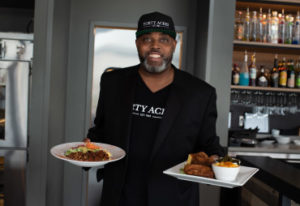MAKE TWICE THE IMPACT
Help us support healthier families, stronger local economies, and a more resilient food system for us all.
Your gift today will be matched thanks to the Hamp Family Fund.

In this quarterly report, we’re excited to announce a new investment in Forty Acres Soul Kitchen, the only full-service, sit-down, 100% African American-owned restaurant in Grand Rapids, Michigan. Hear Fair Food Fund Managing Director Mark Watson talk below about the first time he connected with Forty Acres Soul Kitchen, sparking a new relationship and a new line of thinking.
A year ago, I participated in a gathering of stakeholders interested in supporting Black and Brown entrepreneurs in a mid-sized Midwest city. Included were community foundations and financing organizations as well as community organizations like the local chapter of the NAACP.
What catalyzed the discussion was the noticeable absence of Black and Brown businesses in the city’s newly redeveloped downtown center. This contrasted with the increasing number of Black and Latinx residents living and working in the city. Were there no entrepreneurs of color interested in expansion? Was it due to commercial “redlining”?
It became clear that some startups and sole proprietorships were run by entrepreneurs of color. Yet despite incubators and business chambers supporting these efforts, none were large enough to afford the move downtown.
We came to the realization that one of the major chokeholds was the lack of access to capital in all forms — financial, social, and political — ready to support these businesses as they grew.
I am well-versed in the tremendous racial wealth divide in our country, where white households possess 20x more wealth than Black households. With a career in finance, I also know that traditional banking, private equity, and venture capital continue to have embedded elements that make it difficult for some entrepreneurs on the beginning and middle rungs of the economic ladder to get a strong toehold. If we wanted a different outcome, we needed to do something different.
Key is providing flexible, patient, inexpensive capital in a more equitable manner. Instead of credit algorithms and heavy collateralization requirements, why not focus on the integrity of the business model, the entrepreneur’s commitment to their community, and distributed ownership models that can create individual and community wealth?
These ideas were spurred on by a chance meeting with one of the participants who had just opened the only full-service, sit-down, 100% African American-owned restaurant in the city. He was sourcing from Black-owned farms, paying his employees living wages, and trying to become part of the city’s economic fabric. He was also having trouble getting the growth capital he needed, despite having grown his business to approximately $1.3 million in revenues in just two years! I was impressed. I took his number and promised I would do what I could to provide more solutions.
Several months later, I had the opportunity to assume the helm of Fair Food Fund as its new Managing Director. I called up this entrepreneur and slotted him to present to our Investment Committee. We collectively agreed to not only provide flexible, inexpensive working capital, but also pay for a nationally recognized business consultant to give him one-on-one customized support.
This was the beginning of a relationship with 40 Acres Soul Kitchen, our newest Fair Food Fund investment, that I hope will become a long-term partnership as it continues to grow.
This is how change occurs — entrepreneur by entrepreneur, community by community. My hope is that if we all can lean in to support more talented entrepreneurs of color as they start and scale their ideas, communities across the country will better reflect the diversity of entrepreneurial talent that already exists, and together, we will grow a healthier, wealthier, and more equitable tomorrow.
Mark Watson
Managing Director